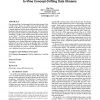Free Online Productivity Tools
i2Speak
i2Symbol
i2OCR
iTex2Img
iWeb2Print
iWeb2Shot
i2Type
iPdf2Split
iPdf2Merge
i2Bopomofo
i2Arabic
i2Style
i2Image
i2PDF
iLatex2Rtf
Sci2ools
118
click to vote
KDD
2004
ACM
2004
ACM
Systematic data selection to mine concept-drifting data streams
One major problem of existing methods to mine data streams is that it makes ad hoc choices to combine most recent data with some amount of old data to search the new hypothesis. The assumption is that the additional old data always helps produce a more accurate hypothesis than using the most recent data only. We first criticize this notion and point out that using old data blindly is not better than "gambling"; in other words, it helps increase the accuracy only if we are "lucky." We discuss and analyze the situations where old data will help and what kind of old data will help. The practical problem on choosing the right example from old data is due to the formidable cost to compare different possibilities and models. This problem will go away if we have an algorithm that is extremely efficient to compare all sensible choices with little extra cost. Based on this observation, we propose a simple, efficient and accurate cross-validation decision tree ensemble metho...
Related Content
| Added | 30 Nov 2009 |
| Updated | 30 Nov 2009 |
| Type | Conference |
| Year | 2004 |
| Where | KDD |
| Authors | Wei Fan |
Comments (0)

